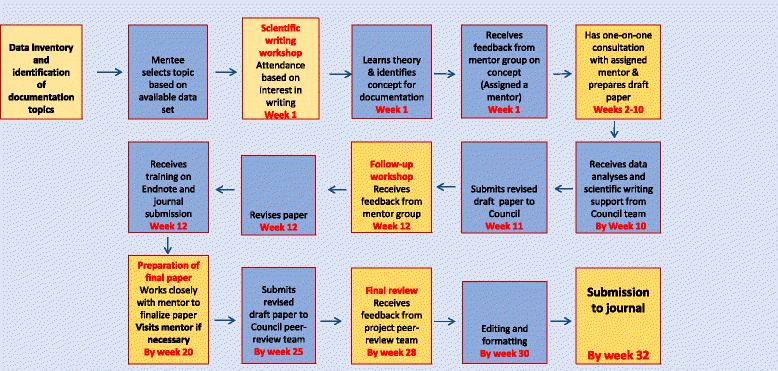Building the evidence base on the HIV programme in India: an integrated approach to document programmatic learnings
- PMID: 29530047
- PMCID: PMC5848569
- DOI: 10.1186/s12961-018-0291-3
Building the evidence base on the HIV programme in India: an integrated approach to document programmatic learnings
Abstract
Background: The Knowledge Network project was launched in 2010 to build evidence on the HIV epidemic by using the data generated by HIV programme implementing organisations in India. This paper describes the implementation of the programme and the strategies adopted to enhance the capacity of individuals to document and publish HIV prevention programme learnings. Further, it discusses the outcomes of the initiative.
Methods: A multipronged approach was adopted, where a group of experts were brought together to collaborate with programme implementing organisations, review available data, develop research questions and guide peer-reviewed publications. Further, scientific writing courses were conducted to support individuals from HIV programme implementing organisations as well as educational and government organisations (mentees) to build the documentation capacity of individuals leading programme implementation and current and future researchers. The impact and quality of evidence generated was measured by examining the number of papers published, the number of citations, and the number of papers with at least 10 citations. Additionally, course participants' responses to open-ended questions in the anonymous course evaluation questionnaires are presented as verbatim quotes.
Results: Overall, 99 papers on HIV programmatic learnings from India were finalised under the programme, of which 95 have been published. In all, 67 papers were co-authored by mentees. Most papers were published in high-impact factor (1 or more) journals and 72% were cited at least once in the literature. The main themes documented include key populations' HIV risk, HIV risk of general population groups, HIV/STI service delivery models and community mobilisation interventions.
Conclusion: The study demonstrates that an integrated approach, involving partnership, capacity-building and mentorship, can maximise the use of available data and build the evidence base on HIV programmatic learnings. The capacity-building model adopted in the programme can be used to build scientific writing and documentation capacity in other public health programmes that are implemented at scale.
Keywords: Documentation; Evidence; HIV programme; India; Mentorship; Peer-reviewed publications; Scientific writing.
Conflict of interest statement
Ethics approval and consent to participate
Ethical approval for the study was submitted to the Population Council’s Institutional Review Board, which exempted the project from review as it did not involve any primary data collection.
Consent for publication
Not applicable.
Competing interests
The authors declare that they have no competing interests.
Publisher’s Note
Springer Nature remains neutral with regard to jurisdictional claims in published maps and institutional affiliations.
Figures
Similar articles
-
Exploring experiences in peer mentoring as a strategy for capacity building in sexual reproductive health and HIV service integration in Kenya.BMC Health Serv Res. 2014 Mar 1;14:98. doi: 10.1186/1472-6963-14-98. BMC Health Serv Res. 2014. PMID: 24581143 Free PMC article.
-
Impact of the Fogarty Training Program on Trainee and Institutional Research Capacity Building at a Government Medical College in India.Ann Glob Health. 2020 Jul 28;86(1):86. doi: 10.5334/aogh.2932. Ann Glob Health. 2020. PMID: 32775217 Free PMC article.
-
Models and approaches for building knowledge translation capacity and capability in health services: a scoping review.Implement Sci. 2024 Jan 29;19(1):7. doi: 10.1186/s13012-024-01336-0. Implement Sci. 2024. PMID: 38287351 Free PMC article.
-
Adapting operational research training to the Rwandan context: the Intermediate Operational Research Training programme.Glob Health Action. 2017;10(1):1386930. doi: 10.1080/16549716.2017.1386930. Glob Health Action. 2017. PMID: 29119872 Free PMC article.
-
Evaluation design for large-scale HIV prevention programmes: the case of Avahan, the India AIDS initiative.AIDS. 2008 Dec;22 Suppl 5:S1-15. doi: 10.1097/01.aids.0000343760.70078.89. AIDS. 2008. PMID: 19098469 Review.
Cited by
-
Strengthening research capacity: a systematic review of manuscript writing and publishing interventions for researchers in low-income and middle-income countries.BMJ Glob Health. 2022 Feb;7(2):e008059. doi: 10.1136/bmjgh-2021-008059. BMJ Glob Health. 2022. PMID: 35165096 Free PMC article.
References
-
- Mugabo L, Rouleau D, Odhiambo J, Nisingizwe MP, Amoroso C, Barebwanuwe P, Warugaba C, Habumugisha L, Hedt-Gauthier BL. Approaches and impact of non-academic research capacity strengthening training models in sub-Saharan Africa: a systematic review. Health Res Policy Syst. 2015;13:30. doi: 10.1186/s12961-015-0017-8. - DOI - PMC - PubMed
-
- National AIDS Control Organisation (NACO) Annual Report 2012–13. New Delhi: Ministry of Health and Family Welfare; 2014.
-
- National AIDS Control Organization (NACO) National AIDS Control Program: Response to the HIV Epidemic in India. New Delhi: Department of AIDS Control; 2010.
-
- Dandona L. Enhancing the evidence base for HIV/AIDS control in India. Natl Med J India. 2004;17(3):160–6.2. - PubMed
Publication types
MeSH terms
LinkOut - more resources
Full Text Sources
Other Literature Sources
Medical



